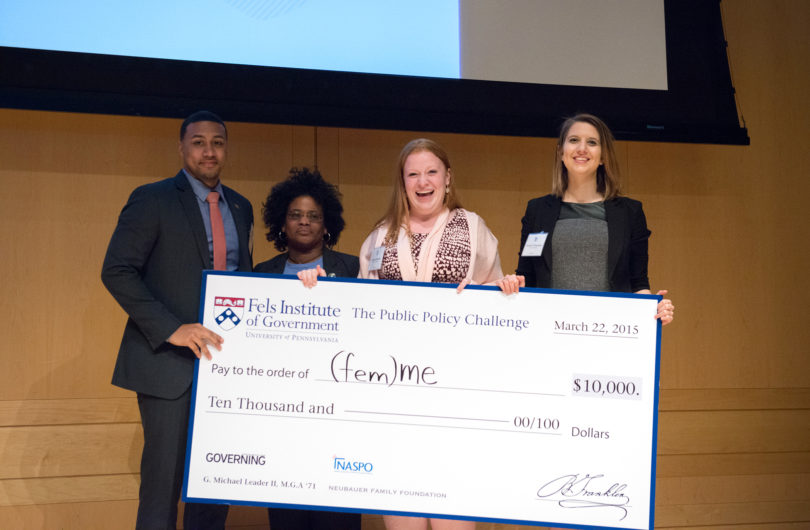Athens, Ga. – With an innovative proposal addressing a silent public health problem for homeless women, four students from the University of Georgia won the top prize in the fourth annual Public Policy Challenge National Invitational in Philadelphia earlier this month.
The winning proposal, called (fem)me, is a plan to distribute feminine hygiene products to homeless and transitional women in Athens and ultimately throughout the state of Georgia. In addition, (fem)me will serve as an education and advocacy organization to raise awareness about the lack of access to feminine hygiene products that vulnerable women experience and the mental and physical health problems that follow.
Master’s students Brianna Roberts and Phillip McAuley from the School of Public and International Affairs and Nicole La Tournous and Paula Buchanan from the College of Public Health competed in the invitation-only competition. As national winner, the UGA team will receive a $10,000 prize to implement its proposal.
“This opportunity has given all of us hands-on experience throughout every step of the policy process-from problem identification to creating and implementing a policy solution,” La Tournous said. “Partaking in this challenge has reaffirmed my passion for health policy.”
The Public Policy Challenge, presented by the Fels Institute of Government at the University of Pennsylvania and Governing Magazine, enables students with a passion for public service to design a solution for a public policy issue important in their community and pitch it before a panel of judges.
Speaking on behalf of the competition judges before announcing the winning team, Julia Burrows, director of the Governing Institute, said that the decision was not an easy one.
“All the teams here were addressing a compelling public policy issue,” Burrows said, but the winning team “picked an issue that none of us had even thought about, (came) up with a solution that’s replicable and scalable … and had the courage to address an issue that might be uncomfortable to talk about.”
Athens-Clarke County is one of the poorest counties in the nation, with 36.7 percent of the population living below the poverty level. As of 2013, an estimated 213 homeless individuals were living in Athens with 75 percent of this number reporting Athens as the origin of their homelessness. Up until now, the lack of access to feminine hygiene products in Athens and other communities as well as across the country has been a silent problem.
“The impact of (fem)me cannot be overstated. Without access to feminine hygiene products, homeless women experience severe physical, mental and practical setbacks,” said W. David Bradford, George D. Busbee Chair in Public Policy in SPIA. “These setbacks can have serious repercussions on their ability to gain and keep employment as well as to be able to rejoin the general community.”
The team is in the process of establishing a 501(c)3 nonprofit organization and will move forward with implementing the program this summer, in collaboration with the Northeast Georgia Homeless Coalition. Additionally, (fem)me will expand its efforts to develop partnerships with local nonprofits in Athens serving the homeless community, such as Athens PB&J and the Athens Resource Center for the Homeless opening in July.
“This experience, tackling real world problems with policy solutions, can be very powerful for students in the fields of public health and policy,” said Grace Bagwell-Adams, an assistant professor of health policy and management in the College of Public Health. “It not only gives them the chance to do some applied work outside the classroom, it gives them motivation and a platform to think outside the box. It is a chance to see how their ideas and hard work can change communities for the better. That kind of experience can set a student on a trajectory of social action and innovation for an entire career.”
More information on SPIA and the College of Public Health is available at http://spia.uga.edu/ and www.publichealth.uga.edu.






